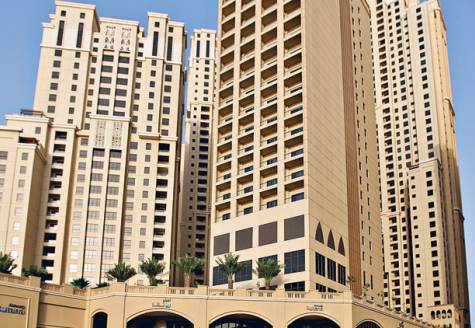 Business & Finance Club - Dubai: Rotana Hotels has opened its first property with direct beach access in Dubai at the Jumeirah Beach Residence.
Confident that summer will draw visitors, the hotel offers 301 rooms all of which have sea views and are built in a modern contemporary style with Arabic design touches woven throughout the common spaces. The interior design is light and in tune with its location by the sea, colourful yet simple and with attention to detail.
Several restaurants, include the Horizon sporting the blue of the sea, Rosso in Italian red and a sushi and steak house. The Rotana Club lounge on the 25th floor affords great views over the Palm Jumeirah.
A pool deck, including a shaded one for children, offers views over the sea and soon there will be private beach as included in the original master plan. The opening of the hotel, which is owned by an Abu Dhabi consortium, has been delayed by two years because of contractual agreements between the owner and the developer of Dubai Properties, Omer Kaddouri, Chief Operating Officer, Rotana Hotels, said.
"This is indeed a good time to open. Traditionally, beach areas have had decent business whether summer or winter occupancies were good. We expect 40 per cent occupancy until the end of Ramadan rising to 80 per cent in the last quarter of this year," said Kaddouri.
To entice visitors to stay at Amwaj and not at one of its direct competitors, including the Sheraton and Hilton along the same stretch of beach front, it is offering an opening rate of Dh499 this summer.
Although Kaddouri said this price is on a par with, and maybe even higher than its competitors, by the end of the year, he expects to charge an average of Dh700.
A lot of discussion in the industry has surrounded the fact that higher occupancies these days are maintained by lowering rates in Dubai, thus affecting RevPAR (revenue per available room). However they're still among the highest in the world, according to reports, such as STR Global.
Revenues
RevPAR was down by 40 per cent on average in Dubai last year according to HVS International, and the hospitality consultancy expects average occupancy for the GCC region to hover between 68 to 73 per cent this year.
Dubai's RevPAR performance back in 1994 was $87 (Dh 319.48) per room, rising over the years to $92 (Dh337.85) in 1997, dropping back again to $71 (Dh260.73) in 2001 and then rose to $225 (Dh826.26) and back down to $128 (Dh470.05) in 2009, according to HVS.
In other words, hotels are still doing extremely well profit-wise and shouldn't have a problem surviving, even though another 14,000 rooms are envisaged to come on-line over the next four years in Dubai alone. Rotana manages 3,300 rooms in Dubai and Kaddouri is upbeat about the future. As business and occupancies are on the rise again he says so-called price wars between hotels are actually the way to go in the future.
Much ado about baths
Over the years, much ado has been made about the number of bath tubs necessary to achieve a higher hotel classification. A 3-star hotel needs to have a minimum ratio of 50/50 bathtubs and showers. The Traders, for example, changed showers to baths to achieve a higher star rating.
The Amwaj Rotana has been given a 5-star rating, but the hotel hasn't got enough bathtubs yet. The Centro in Barsha also has to add bathtubs. However the Amwaj is expected to catch up by the end of the year and Kaddouri said that there are quite a few hotels in Dubai and Abu Dhabi which were downgraded and asked to install more bathtubs or else to upgrade in order to justify the given stars.
"Both ADTA and DTCM are developing their classification system based on international destinations, which is great. What could add even more value would be to look at international trends every year," he added. He reckons, like many hoteliers, that customers actually prefer showers to bathtubs, in particular when investors have to save on space. A large double shower with rain shower et al is actually more attractive than a simple bathtub. |